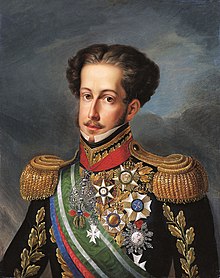Our website is made possible by displaying online advertisements to our visitors.
Please consider supporting us by disabling your ad blocker.
Pedro I of Brazil
| Pedro I | |||||
|---|---|---|---|---|---|
| Duke of Braganza | |||||
 Portrait attributed to Simplício de Sá, c. 1830 | |||||
| Emperor of Brazil | |||||
| Reign | 12 October 1822 – 7 April 1831 | ||||
| Coronation | 1 December 1822 Imperial Chapel | ||||
| Predecessor | John VI (as King of Brazil) | ||||
| Successor | Pedro II | ||||
| King of Portugal | |||||
| Reign | 10 March 1826 – 2 May 1826 | ||||
| Predecessor | John VI | ||||
| Successor | Maria II | ||||
| Born | 12 October 1798 Queluz Palace, Queluz, Portugal | ||||
| Died | 24 September 1834 (aged 35) Queluz Palace, Queluz, Portugal | ||||
| Burial |
| ||||
| Spouses | |||||
| Issue | |||||
| |||||
| House | Braganza | ||||
| Father | John VI of Portugal | ||||
| Mother | Carlota Joaquina of Spain | ||||
| Religion | Roman Catholicism | ||||
| Signature |  | ||||
Dom Pedro I (12 October 1798 – 24 September 1834) was the founder and first ruler of the Empire of Brazil, where he was known as "the Liberator". As King Dom Pedro IV, he reigned briefly over Portugal, where he also became known as "the Liberator" as well as "the Soldier King".[A] Born in Lisbon, Pedro I was the fourth child of King Dom John VI of Portugal and Queen Carlota Joaquina, and thus a member of the House of Braganza. When the country was invaded by French troops in 1807, he and his family fled to Portugal's largest and wealthiest colony, Brazil.
The outbreak of the Liberal Revolution of 1820 in Lisbon compelled Pedro I's father to return to Portugal in April 1821, leaving him to rule Brazil as regent. He had to deal with challenges from revolutionaries and insubordination by Portuguese troops, all of which he subdued. The Portuguese government's threat to revoke the political autonomy that Brazil had enjoyed since 1808 was met with widespread discontent in Brazil. Pedro I chose the Brazilian side and declared Brazil's independence from Portugal on 7 September 1822. On 12 October, he was acclaimed Brazilian emperor and by March 1824 had defeated all armies loyal to Portugal. A few months later, Pedro I crushed the short-lived Confederation of the Equator, a failed secession attempt by provincial rebels in Brazil's northeast.
A secessionist rebellion in the southern province of Cisplatina in early 1825, and the subsequent attempt by the United Provinces of the Río de la Plata to annex it, led the Empire into the Cisplatine War. In March 1826, Pedro I briefly became king of Portugal before abdicating in favor of his eldest daughter, Dona Maria II. The situation worsened in 1828 when the war in the south resulted in Brazil's loss of Cisplatina. During the same year in Lisbon, Maria II's throne was usurped by Prince Dom Miguel, Pedro I's younger brother. The Emperor's concurrent and scandalous sexual affair with Domitila de Castro tarnished his reputation. Other difficulties arose in the Brazilian parliament, where a struggle over whether the government would be chosen by the monarch or by the legislature dominated political debates from 1826 to 1831. Unable to deal with problems in both Brazil and Portugal simultaneously, on 7 April 1831 Pedro I abdicated in favor of his son Dom Pedro II, and sailed for Europe.
Pedro I invaded Portugal at the head of an army in July 1832. Faced at first with what seemed a national civil war, he soon became involved in a wider conflict that enveloped the Iberian Peninsula in a struggle between proponents of liberalism and those seeking a return to absolutism. Pedro I died of tuberculosis in September 1834, just a few months after he and the liberals had emerged victorious. He was hailed by both contemporaries and posterity as a key figure who helped spread the liberal ideals that allowed Brazil and Portugal to move from absolutist regimes to representative forms of government.
Cite error: There are <ref group=upper-alpha> tags or {{efn-ua}} templates on this page, but the references will not show without a {{reflist|group=upper-alpha}} template or {{notelist-ua}} template (see the help page).
Previous Page Next Page
Pedro I van Brasilië AF Petrus I Brasil Cāsere ANG بيدرو الأول إمبراطور البرازيل Arabic بيدرو الاول امبراطور البرازيل ARZ Pedro I de Brasil y IV de Portugal AST I Pedru (Braziliya imperatoru) AZ بیرینجی پدروی (برزیل) AZB Педро I BA Педру I (імператар Бразіліі) BE Пэдру I (імпэратар Бразыліі) BE-X-OLD


